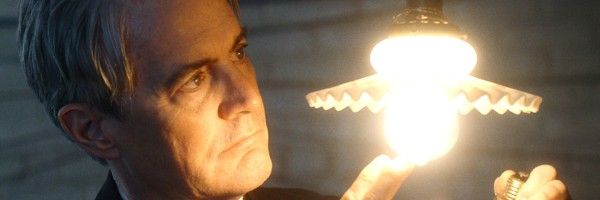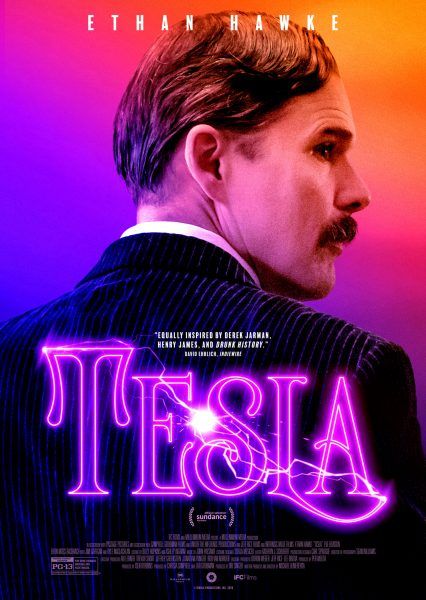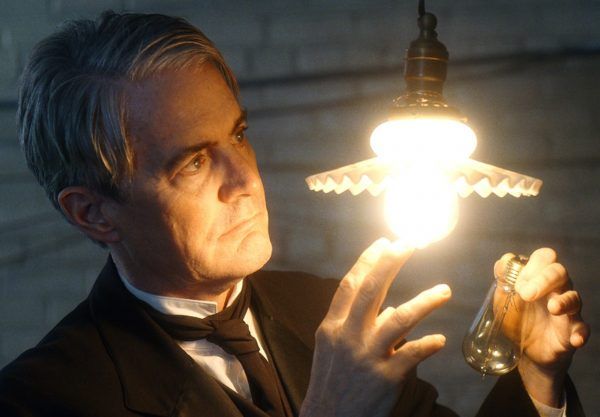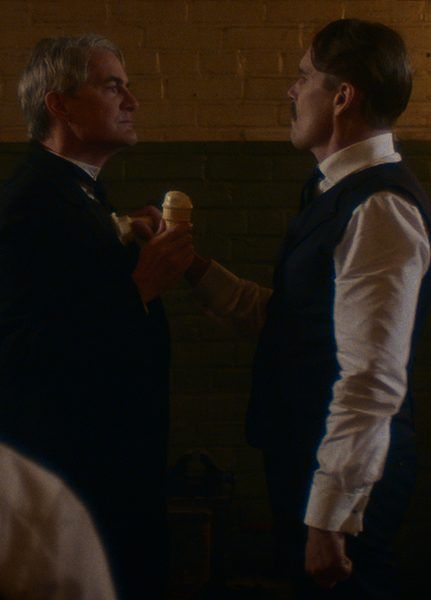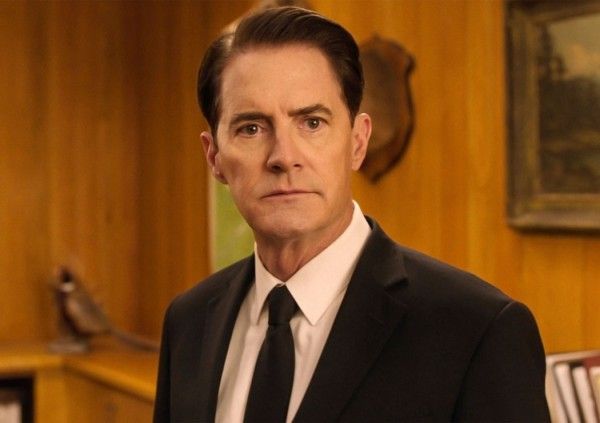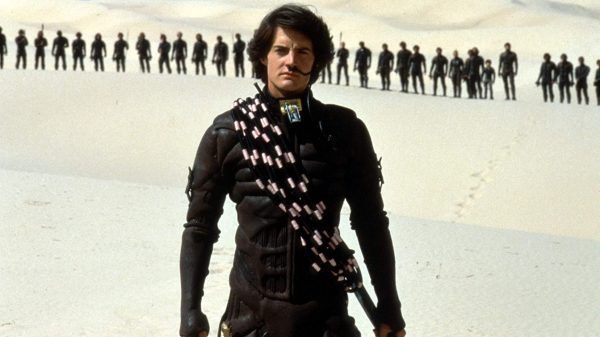From director/writer/producer Michael Almereyda, the indie drama Tesla tells the story of brilliant visionary Nikola Tesla (Ethan Hawke) and his fight to bring his inventions to the world. Framing the story in a unique way, we get to know Tesla as an individual while also exploring fellow inventor Thomas Edison (Kyle MacLachlan) and the dynamic between the two complicated men.
During this 1-on-1 phone interview with Collider, Kyle MacLachlan talked about reuniting with Michael Almereyda and Ethan Hawke for this project, the very independent film nature of this shoot, how he approached researching Thomas Edison, the qualities he saw in the man, and smashing an ice cream cone on his co-star. He also talked about his experience working with Pixar for Inside Out, whether he thinks there could ever be more Twin Peaks, his time on Agents of S.H.I.E.L.D., why he’s interested in the re-imagining of Dune, the impression Oliver Stone made on him while shooting The Doors, and what interests him in a project.
Collider: This is such an interesting story, and an interesting take on this dynamic and relationship, much like Capone was another very interesting take on a guy that we think we know, but clearly there are so many other layers there.
KYLE MacLACHLAN: Yeah, I agree with you. Nice connecting the dots there. Well done.
With a project like this, where you’ve previously worked with the director, Michael Almereyda, and with Ethan Hawke, do you just get a phone call about reuniting with them? How does a project like this come to your attention, when you already know the people involved?
MacLACHLAN: Like anything independent, it’s a long, slow, painful process. It’s just so hard to not only coordinate the schedule, but just raise the money, quite simply, to go forward. It took real perseverance, on the part of Michael Almereyda. Herding cats is how it’s described. There are so many things that are working against you to, to make it so easy to not do it, that to actually get it to be done is a triumph, in and of itself. I was excited ‘cause I love working with Michael and I really, really love working with Ethan. He’s just a one of a kind, special person. He’s not only a great actor, but a wonderful artist, thoughtful and charismatic, but he has an interesting take on the world and on things. It was a lot of fun working together. There was a lot of laughter. There’s nobody that I’d rather go into a scene with than Ethan. He’s up for anything and open to interpretation, and just a very generous and gracious spirit. And Michael is so thoughtful and careful and quiet, and very unassuming, but really specific about what he’s looking for and what he needs to tell the story, and I enjoy working with him, as well. He creates a very gentle atmosphere on the set. There’s never a sense of anxiety or anything like that. He’s just very steady.
What is that like, when you get a script and you know it’s an independent film, so you don’t know exactly when you’ll get to do the shoot, and then, all of a sudden, it comes together. With you being busy and Ethan Hawke being busy, how hard is that to work out? Did it ever seem like you wouldn’t be able to work it out?
MacLACHLAN: Yeah, it did, for a long time. We were all trying to figure out how it was going to work. Ethan had stuff that he was doing, and I had stuff that I was doing. It’s almost like, if you don’t just say, “We’re gonna go on this day,” it’ll never get done. So, you say, “We’re gonna go,” and everyone had to figure it out. I shot for a week. My shooting schedule was very, very minimal, which is great ‘cause you can get in and get out. We shot all around New York. I took the subway out to work ‘cause there was no money for picking up at the apartment. You had to just get there. The dressing rooms were in one giant room that was separated by curtains and everybody was in one place. It’s a beautiful way to work. So often, in everything else that I’ve done, everyone retreats to their own little caves and hangs out there. Granted, we’re all busy people and we all have things that we’re doing, and we’re trying to keep a life going, while we’re filming. But in this case, it was like, “Well, we’re all in this together, hanging out.” So, we spent time with each other and it had a little bit of a family vibe to it which was exactly what we did when we worked together, previously, on Hamlet, years and years ago. It was the same kind of situation, where we were all in one big room, sitting around, with some people reading and some people doing crossword puzzles. That’s how it works. You know, going in, what the experience is gonna be like.
Which is fine if it’s a briefer period of time because then it’s more like summer camp, but that would be much more challenging on a long shoot.
MacLACHLAN: It’s very much like a camp experience. You’re right, if you’re thinking about doing something like that for any length of time, you would need to be able to retreat to the safety of your own spot. But coming in for a week, it was not a problem.
When you get asked to play a character like Thomas Edison, is it an immediate yes, or did you want to learn more about who he was, especially in this film?
MacLACHLAN: Both. It’s a great opportunity, but one of the exciting things is the research and the exploration that you get to do. It’s an excuse to really take a deep dive into this world of Thomas Edison, who he was, and what he accomplished, and then to try to find the man, the person, and the individual behind all of the invention and the stories and the history. You’re trying to make history come alive. I had the advantage of there being film of him, talking and giving a tour of his factory, and at work. That was very helpful to me, just to see the physicality and how he carries himself through the world. Plus, Michael had been on this for so long that he had really exhausted his search, in terms of material that’s available. He did all of the refining for me. He said, “These are the few books that you need to look at. These are the ones that will have the most impact on what you’re going to do.” I appreciated that because there’s an awful lot of material on him.
Did you have any thoughts on Edison going into this, and how do you think of him now that you’ve played him?
MacLACHLAN: I didn’t know a lot about him, apart from what everyone seems to know about. I thought he invented the lightbulb, but he didn’t actually invent the lightbulb, but he perfected it and made it commercially available. He was an extraordinary businessman. We always think of him as an inventor, and he was very capable, but where he was at his best was with perseverance and hard work. He had that never give up sticktuitiveness that’s necessary for an inventor. He surrounded himself with really smart, hardworking people, and was able to create this team that worked together very, very well, with him in the lead. He was a workaholic, but a napper, so he would take a 20-minute nap, anywhere he was. He would lay down on a table or sit in a chair, and he would do a quick little catnap, and then, come back hard at it. We all know the quote that he said, which is, “Genius is 1% inspiration, 99% perspiration.” But the one that I found particularly interesting was when he said, “Opportunity is overlooked by most people because it comes wearing overalls and it looks a lot like work.” And I was like, “Yeah, that’s it. It doesn’t just plop itself right down in your lap. You’ve gotta go work for it.” Sometimes we tend to think that, with people like Edison, everything comes easy. That’s not the case, at all. It’s very hard work, and requires that perseverance that he possessed. Those were all qualities that I took away from the research and that was there in the script, so I tried to support what was there, with that reality.
You have a very fun, unexpected moment in this, when you and Ethan Hawke are both eating ice cream cones, and then smashing them on each other. What was that scene like to shoot?
MacLACHLAN: It was fun, as you can imagine, but you also wanna get the precision and the rhythm of it just right. You think back to some of the old comedians, like Charlie Chaplin and Buster Keaton, to get the rhythm and tempo of that time. Both Ethan and I recognized that immediately, so we immediately started talking about the timing and playing it absolutely straight. There’s no winking. There’s no laughing at each other. It’s gotta be very, very serious, or you lose the craziness, the unexpectedness, and some of the humor, as well. That’s the thing about working with Ethan. He just intuitively knew, and we both intuitively knew that. There are some actors that wouldn’t understand that or get that.
You worked with Pixar on Inside Out and on the Riley’s First Date short. As someone who’s had an inside look at the whole process, what do you think it is that makes Pixar so special, and do you hope to get to do another project with them?
MacLACHLAN: I hope I do. They’re some of the nicest people that you’ll ever work with. Pete Docter, our director, and Jonas Rivera, our producer, and (co-director) Ronnie Del Carmen was on there, as well, and just the whole team was just so nice, so creative, and so excited, for my little tiny contribution to the movie. That made me feel really, really good. I would love to work with them again. One of their strengths is the fact that they spend roughly five years, if I understand correctly, working on the story, the animation, and the process. When you live with a story and a reality for that long, you really, really know it and you’re able to tell the story. It’s like how, with fables, they’re passed down through generations, and they’re woven and shaped, and the good stuff stays while the stuff that’s not really working goes away. It’s like that. They have time with these stories to really, really develop them to their absolute top potential.
Would you be curious to do a sequel for Inside Out, to catch up with Riley older, at some point in her life?
MacLACHLAN: Yeah. I loved doing Riley’s First Date. That was really fun and unexpected. I love the direction that it went. I thought it was a really cute follow up to the movie, that little five-minute short.
Do you think that there’s a chance of there ever being more Twin Peaks episodes, or do you feel like we’ve definitely come to the end of that saga now?
MacLACHLAN: I don’t know. David is such an interesting and enigmatic person. I would never say never. I don’t think it’s probably gonna happen, but knowing David, I just don’t know. If he were to return, it would be so much fun. I would love to come back and reprise that role, in any situation. Any way that he would create it would be really exciting to me. But at this point, I just don’t know.
Agents of S.H.I.E.L.D. just came to its series conclusion, after seven seasons. What are the memories that stick with you, when it comes to having been a part of that show?
MacLACHLAN: It was a universe that I didn’t really know much about, and they came to me and said, “Would you like to do this?,” and I was really intrigued by it. I thought, “I don’t know this. Let me do a little exploration.” I saw what they wanted, and I was really excited by the idea of the father-daughter relationship, and wanted to try to understand and get some depth and reality to the pain that they both felt. I appreciated that you got a little bit of a backstory for the character, to understand why he may have become who he became. When you’re accepting the fact that everyone has got these superpowers and they’re in this different kind of space, I wanted to know about the person and the reality, and whether what happens to them resonates with where they are now and whether it transforms them in a way that’s possible to reveal. That was interesting to me, in that particular instance. And I’ve gotta say that Chloe [Bennet] is so delightful and such a lovely person to work with. She’s got a great sense of humor and a very interesting, almost self-deprecating sense of herself. She’s very real, and I enjoyed working with her a lot.
What’s it like for you to get to a point in your career now, where the first film that you did, Dune, and has now been remade and re-imagined by a different filmmaker and a whole different cast? Does it make you curious to see what they’ve done?
MacLACHLAN: It makes me feel old. I’m really curious. [Denis Villeneuve] is a terrific filmmaker. He’s an extraordinary filmmaker, and his approach will be interesting. The cast is amazing. I think he’s done a beautiful job. Timothée [Chalamet] will be wonderful as Paul. I’m looking forward to it. I love that world so much. I’m a huge fan of the book. I’ve read the book, many, many, many times, both before we did the film and after we finished our film. It remains one of the anchors, really, in terms of the books that I return to, that made a big impression on me, when I was growing up. It was maybe number one. So, yes, I will always look for and watch anything that has to do with Dune.
Do you feel like the time since then and the advances that have happened in filmmaking would have made that version any easier than when you guys did it?
MacLACHLAN: Probably. The sophistication now of effects and what they’re able to do, will allow for much greater versatility. That being said, the idea that most of our effects are what they call practical was pretty amazing. There is something very interesting about being able to actually be in the scene with the thing that you’re working with. It wasn’t at the level of sophistication that they can do now, but I think it has its own merits.
We’ve talked a lot about the time that you’ve spent working with David Lynch, but you also got to work with Oliver Stone on The Doors. What was it like to work with him? How do you find his approach to filmmaking, during a shoot?
MacLACHLAN: Oliver is complicated. He’s volatile. Sometimes he can do a little psychological psych-out on you. I loved working on the movie. I loved pretending to be a rock star, for a few months. That was really cool. I loved working with Val [Kilmer]. I really like him, as a person. He’s also a complicated person, but I’ve got great affection for him. My approach with Oliver was just to stay out of the way and be a little bit under the radar. It was a massive production, so I was able to do that, by and large. I just didn’t really want him to focus on me, at any given moment. But I love him. We were gonna work together on Platoon, and that didn’t work. And then, he came back to me on The Doors, and I was very grateful. We did ultimately have a great time together
Have you been curious to check out his memoir?
MacLACHLAN: Yeah, I’m very curious about that. He’s lived a big life, and his point of view is interesting. He has a very strong point of view. It’s one of the reasons that he and the actual man that I played, Ray Manzarek, had a falling out, early on in the filming. Oliver had a particular story to tell, and Ray Manzarek, at that point, had been the keeper of the flame, so to speak, of Jim [Morrison] and The Doors, and they didn’t necessarily see eye to eye on that interpretation. So, it was a bit challenging.
And you’ve taken on yet another real-life character, with President Franklin D. Roosevelt in Atlantic Crossing.
MacLACHLAN: That should be out at the end of this year. I don’t know the plans that PBS has for it, but that’s another great character. You’ve just gotta fly into it, grit your teeth, and hope for the best.
You work quite a lot, doing film and TV, and various voice work. What is your approach to picking projects, these days? Has what’s important to you about the work changed, over the years?
MacLACHLAN: In some ways, it’s what I think I can bring to a project. It’s really important for me to get a sense of what the director is after, why he’s telling the story, what the point of it is, and what he’s trying to do, so that I can understand how I fit into what he’s trying to do. He or she. And then, it comes down to what I feel that I can bring to it. Can I contribute something? Do I have something to offer? Will it be worthwhile? Will it be worth my time to invest in it, like that? You start looking at these questions and ideas, or sometimes it’s just, am I gonna have a fun time doing this? It can be something that I’ve never done before, and it could be a great month with some interesting people. So, it really depends on the project and my state of mind, at the time.
Tesla is available on-demand.
Christina Radish is a Senior Reporter of Film, TV, and Theme Parks for Collider. You can follow her on Twitter @ChristinaRadish.

